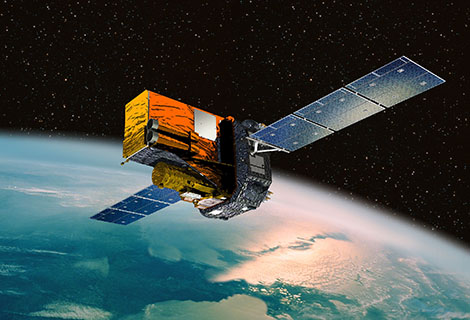Research in Physics and Astronomy at Southampton has led to the creation of a spin-out company – Symetrica - that is a world-leader in the field of homeland security - helping national security agencies improve their ability to detect dirty bomb threats at ports in the USA and the EU with highly sensitive gamma-ray detection and identification technologies.
Research challenge
Pioneering research by Southampton’s Astronomy Group over the last 40 years explored designing technology for gamma-ray detection with the initial aim of developing the European Space Agency’s INTErnational Gamma-Ray Astrophysics Laboratory (INTEGRAL) space telescope.
INTEGRAL was one of the first space telescopes with high-resolution imaging and spectroscopy systems and was deployed into space in the early 2000s to help solve some of astronomy’s biggest mysteries.
Spin-out company Symetrica was created in 2002 to commercialise this research into applications that could be used in counter-terrorism and healthcare.
The focus on counter-terrorism activities has been increasing significantly with a continuing requirement for more sophisticated forms of detection. The challenge was to develop detection systems that could distinguish between different forms of radioactive materials and also be effective, accurate, portable and user-friendly.

Our solution
The development of INTEGRAL was a breakthrough in Southampton’s research led by Professor Tony Bird. His research optimised the design of gamma-ray detectors to make them more cost-effective and remove the need for a high-voltage supply.
Extensive experience gained from the operation of INTEGRAL has enabled Symetrica to expand this technology to help security agencies around the world improve their detection of dirty bomb threats and contribute to tighter nuclear safety procedures.
Image credit: INTEGRAL in orbit artist impression courtesy of European Space Agency.
What was the impact?
Symetrica has grown strongly over the years and has established itself as a world-leader in the field of homeland security with its work into gamma-ray detection having had a significant impact on homeland security and nuclear safety.
The company has developed its research to be able to distinguish different radiation sources and accurately identify threat materials hidden in heavily shielded containers. Its high-performance systems have also improved the ability to differentiate between illicit radioactive materials and naturally occurring radioactive materials.
Deploying these improved security portals at UK ports has benefited the UK economy by increasing transit rates at ports, reducing the number of nuisance alarms when scanning containers and improving national security by providing better detection rates for genuine contraband.
Four Symetrica portals have also been installed at the Tata Steel Ltd site in Port Talbot to screen incoming material and prevent the accidental melting of radioactive sources, which has been a major problem for the metals processing industry. These measures have improved worker safety, and reduced the financial consequences of decontamination, waste disposal and lost revenue generated by the temporary shutdown of the mill.
A partnership between Symetrica and Smiths Detection – a world-leading provider of detection systems for X-rays, explosives and traces of radioactive materials – led to the award of a multimillion dollar contract from the US Department of Homeland Security’s Domestic Nuclear Detection Office (DHS’s DNDO) to develop next generation radiation detection systems that could identify highly enriched uranium, plutonium and other radioactive materials. These systems are now the DHS’s DNDO’s primary device to help port and border personnel evaluate cargo, containers and vehicles.
Symetrica’s UK market has grown rapidly in the last few years and it has established strong export sales with its equipment is being used in many other countries across the globe including Holland, Belgium, Finland, South America, the Middle East, Hong Kong, Israel and Italy. It has also seen its employee numbers increase from 26 to 75 between 2014 and 2019.
The company has further expanding its technology through a Space Research and Innovation Network for Technology (SPRINT) collaboration with the University’s Physics and Astronomy department and University Southampton Hospital NHS Foundation Trust to translate the imaging technology from INTEGRAL into medical imaging applications.
Find out more
Talk to our research team and find out more about this work. Professor Tony Bird led the research on this project.